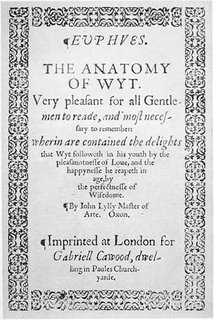8. John Lyly - Euphues : The Anatomy of Wit (1578)

Buy it at Amazon UK
Review
Francisco: Ok, this was a terrible book. John Lyly invented a new form of writing, and that is not a good thing. Lyly invented "euphuism" or writing stuff in an overly complex way. If you can imagine this book it is something like: endless monologue, followed by endless "monologuical" reply followed by another monologue and then a letter to top it off. It's like a dialogue where each person takes 2 or 3 pages to say his line. It's terrible.
This style of writing also becomes very silly very quickly. In fact, even though there was a fashion for speaking in "euphuism" in the Elizabethan court it quickly fell out of fashion and became a style of mockery. It is later used by Shakespere for comic effect. Lyly just doesn't stop when he should, if he gets a comparison he doesn't use one but a hundred. It's exhausting to read, as nothing much ever happens, and for god's sake if you are reading it avoid reading beyond the narrative bit (after Euphues leaves Lucillia) as it is just him writing letters about a variety of themes. I got the text in an Anthology of Elizabethan Prose Fiction where they don't even print the remaining of the book because of its dullness.
I would advise you to look at the book, get a feel for it and then burn the bastard. It is interesting in terms of: "How could anyone ever have found this good?" and I do admire the effort that Lyly had to put into this. But it really is a book to avoid if you like to enjoy what you read.
Vanda: Oh, dear gods, the boredom.
Extensive use of metaphor in this book seems interesting at first, but it spirals down into the realm of overwhelming ridiculousness, where a simple sentence takes up half a page just due to sheer amount of (sometimes contradictory) comparisons. This gets very old, very fast. After three pages, I decided that I just didn't care, and that this was not an anatomy of wit, but a prolipherous pseudo-intelectual, look-at-how-many-metaphors-I-can-fit-in wankathon.
Nevermind the plot. Actually, it doesn't have a plot per se, at least not in my opinion. Guy wants best friend's girl, girl says no, girl says yes, girl trades guy for half-wit. There. You've read it now!
Still have another of these Elizabethan monstrosities to get through before I get to Cervantes, damn them all to hell. Honestly, at this time, the English couldn't write prose if their lives depended on it.
Final Grade
Francisco: 3/10
Vanda: 2/10
Trivia
Quote:
It is virtue, yea virtue, gentlemen, that maketh gentlemen; that maketh the poor rich, the base-born noble, the subject a sovereign, the deformed beautiful, the sick whole, the weak strong, the most miserable most happy. There are two principal and peculiar gifts in the nature of man, knowledge and reason; the one commandeth, and the other obeyeth: these things neither the whirling wheel of fortune can change, neither the deceitful cavillings of worldlings separate, neither sickness abate, neither age abolish.
--- Euphues, the Anatomy of Wit
And so on Ad Nauseam.
From Wikipedia
Euphuism is a mannered style of English prose, taking its name from works by John Lyly. It was a preciously ornate and sophisticated prose style that was fashionable in the 1580s, but never subsequently. The term was not invented by Lyly. Euphuism is a style that focuses on a wide range of literary devices such as antitheses, alliterations, repetitions, rhetorical questions and others. Classical learning and remote knowledge of all kinds is displayed.
The euphuistic sentence followed principles of balance and antithesis. John Lyly set up three basic structural principles:
1. phrases of equal length that appear in succession;
2. the balance of key verbal elements in successive sentences;
3. the correspondence of sounds and syllables, especially between words that are already balanced against each other.
Lyly's style influenced Shakespeare (Polonius in Hamlet; Moth in Love's Labour's Lost; Beatrice and Benedict in Much Ado About Nothing). Many critics thought that Lyly overused comparisons as well as alliterations; Philip Sidney and Gabriel Harvey castigated his style. Euphuism was, however, taken up by the Elizabethan novelists Robert Greene, Thomas Lodge and Barnabe Rich.
Euphuism was not particular to Britain, a manifestation of some social structure and artistic opportunity unique to that country. There were equivalents in other major European languages, each of which was called by a different name: Gongorism in Spain, Marinismo in Italy, and Préciosité in France, for example.
